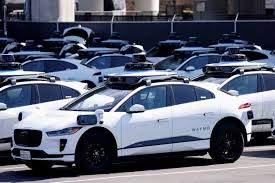Riyadh Takes the Wheel of the Future — Self-Driving Taxis Hit the Roads

Autonomous Taxis Roll Out in the Capital
A bold new era in urban mobility has arrived in Riyadh, where the Kingdom has officially launched its first phase of self-driving taxi operations. The pilot program—developed in collaboration with Uber, iDrive, and WeRide—positions Saudi Arabia at the forefront of automated transportation in the Middle East.
Running across seven major locations, including King Khalid International Airport (Terminal 5) and key city corridors, the 12-month trial will be regulated by the Transport General Authority (TGA). Each vehicle will be monitored in real-time with onboard safety officers, ensuring the performance of AI systems in real-world traffic conditions.
To support the electric fleet, 13 dedicated charging stations have already been installed—marking a step toward both technological advancement and sustainable urban development.
Why This Move Matters for Saudi Arabia
The launch of self-driving taxis isn’t just a tech milestone—it’s a strategic move aligned with Saudi Vision 2030, aimed at redefining how people move and live in the Kingdom’s cities.
According to Minister of Transport Eng. Saleh Al-Jasser, autonomous vehicles are ten times safer than traditional cars. That’s not just a safety upgrade—it’s a revolution in public trust and urban design.
Key benefits include:
- Lower carbon emissions, contributing to Saudi Arabia’s green targets
- Improved traffic safety through machine-precision driving
- Enhanced quality of life, with seamless and intelligent transit experiences
This pilot is part of a wider strategy to transition transport from utility to smart infrastructure, placing Saudi Arabia among global innovation leaders.
The Road Ahead: What Comes Next
This is just the beginning. Uber has announced plans to scale up its autonomous vehicle fleet to 20,000 units by 2030, setting a bold trajectory for driverless transport in the Kingdom.
The rollout forms one component of Saudi Arabia’s larger smart mobility agenda, which includes:
- Hydrogen-powered vehicles
- Electric bus fleets
- Integrated smart rail systems
- Sustainable urban planning frameworks
As cities like NEOM, Riyadh, and Jeddah invest in cutting-edge infrastructure, autonomous mobility becomes more than a possibility—it becomes a standard.
More Than Mobility: A Platform for Innovation
Saudi Arabia is signaling a powerful message: transportation is evolving from a service into a platform—one that merges AI, sustainability, and user-centric design.
From digital fare systems to connected traffic networks, smart mobility is becoming the backbone of urban innovation. Riyadh’s self-driving taxis represent a leap toward:
- Autonomous public services
- AI-integrated city management
- Global tech partnerships that drive economic diversification
Conclusion: Riyadh Is Driving the Future
The deployment of autonomous taxis in Riyadh is more than a tech trial—it’s a national statement. With strong regulatory oversight, global partnerships, and sustainability at its core, this initiative reflects a future-ready Saudi Arabia. As the Kingdom accelerates its Vision 2030 agenda, the streets of Riyadh are turning into testbeds for tomorrow’s smart cities.







